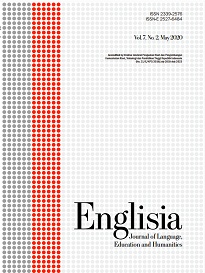The analysis of flouting maxim in Good Morning America (GMA) talkshow
DOI:
https://doi.org/10.22373/ej.v7i2.6630Keywords:
cooperative principles, flouting maxim, Good Morning America (GMA) talkshowAbstract
The present study is an analysis of the flouting maxim in Good Morning America (GMA) talk show in which Jackie Chan was invited as the guest star. The goals of this research are to find out the performed flouted maxim(s) by the hosts and the guest and to reveal the reason(s) behind the occurrence of the maxim(s). In this study, the researchers employed the qualitative method and data were collected from a video. The transcript text of the utterances between the hosts and Jackie Chan as a guest consisting of flouting maxim was the instrument of this research. Then, to find and analyze the flouting maxim showed in the video, the researchers used Grice’s theory, the Cooperative Principles consisting of four maxim types: quality, quantity, relation, and manner. The result showed that all four types of maxim flouting were committed by both Jackie Chan and the two hosts of the GMA talk show. The highest flouting maxims found were flouting the maxim of quantity and manner. Further, the study also revealed the rationales behind maxims flouting which were beneficial to build fun communication and to elaborate more explanations.
Downloads
References
Al-Qaderi, I., & Alduais, A. M. S. (2019). The cooperative principle in political discourse: Flouting Gricean maxims in Modern Standard Arabic political speeches. Research Result: Theoretical and Applied Linguistics, 5(3), 3–13.
Ayasreh, A., & Razali, R. (2018). The flouting of Grice's conversational maxim: examples from bashar al-assad's interview during the arab spring. IOSR Journal Of Humanities And Social Science (IOSR-JHSS), 23(5), 43–47.
Aziz, Z. A., Mustafa, F., & A'la, P. N. (2019). Flouting maxims as a sense of humor in Indonesian Speech Acts. Indonesian Journal of EFL and Linguistics, 4(2), 169–180.
Cutting, J. (2002). Pragmatics and Discourse. London: Routledge.
Cutting, J. (2008). Pragmatics and discourse: A resource book for students. New York: Routledge.
Ekah, M. H., & Akpan, A. N. (2018). Discourse-Syntax interface: A study of Gricean Maxims in computer-mediated discourse. Language in India, 18(2), 187–203.
Grice, P. H. (1975). Logic and conversation. In P. Cole & J. Morgan (Eds.), Syntax and Semantics (pp. 45–47). New York: Academic Press.
Gumperz, J. J. (1982). Discourse strategies. Cambridge: Cambridge University Press.
Hong, M. X. (2007). Pragmatic analysis of the script of kramer vs. kramer with Grice's conversational implicature theory. US-China Education Review, 4(5), 76–81.
Ibrahim, Z., Arifin, B., & Setyowati, R. (2018). The flouting of maxim in the se7en movie script. Jurnal Ilmu Budaya, 2(1), 81–94.
Jacobs, L. R., & Shapiro, R. Y. (2000). Politicians don't pander: Political manipulation and the loss of democratic responsiveness. Chicago: University of Chicago Press.
Kalliomaki, L. (2005). Ink and incapability: verbal humor in tv-sitcom blackadder a pragmatic and rhetorical analysis. University of Jyvaskyla.
Khosravizadeh, P., & Sadehvandi, N. (2012). Some instances of violation and flouting of the maxim of quantity by the main characters (barry & tim) in dinner for schmucks. International Conference on Languages, Literature and Linguistics, 26, 122–127.
Leech, G. N. (1983). Principle of Pragmatics. London: Longman.
Lestari, N. G. (2019). An analysis of flouting maxims in conversation speaking of the main character in the movie of Home Alone 2 "Lost In New York" By John Hughes. Journal of English Pedagogy, Linguistics, Literature, and Teaching, 7(1), 1–11.
Levinson, S. C. (1983). Pragmatics. Cambridge: Cambridge University Press.
Maqsood, W., Waqar, N., & Khalil, U. (2018). Flouting of Grice's conversational maxims in the Movie John Wick. City University Research Journal of Literature and Linguistics, 1(1), 38–69.
Nuringtyas, S. (2018). Flouting maxim analysis on dialogue of characters in Pitch Perfect Movie. Universitas Muhammadiyah Surakarta.
Sembiring, E., & Ghozali, I. (2017). An analysis of maxims flouting in "the jungle book" movie script. Journal of English Language and Language Teaching JELLT, 1(2), 33–39.
Soedjatmiko, W. (1992). Aspek Linguistik dan Sosiokultural di dalam humor. In P. 5 P. L. L. B. A. J. Kelima (Ed.), Bahasa & Budaya (pp. 69–69). Yogyakarta: Kanisius.
Thomas, J. (1995). Meaning in interaction: An introduction to Pragmatics. London: Longman.
Tupan, A. H., & Natalia, H. (2008). The multiple violations of conventional maxims in lying done by the characters in some episodes of Desperate Housewives. K@ta Journal, 10(1), 63–78.
Vergis, N. (2017). The interaction of the maxim of quality and face concerns: An experimental approach using the vignette technique. Journal of Pragmatics, 118, 38–50.
Wahyuni, M., Arifin, M. B., & Lubis, I. S. (2019). An analysis of flouting of maxims done by main characters in La La Land Movie. Jurnal Ilmu Budaya, 3(3), 384–392.
Yule, G. (1996). Pragmatics. Oxford: Oxford University Press.
Zebua, E., Rukmini, D., & Saleh, M. (2017). The violation and flouting of cooperative principles in the ellen degeneres talk show. Journal of Language and Literature, 12(1), 103–113.
Downloads
Published
Issue
Section
License
Proposed Policy for Journals That Offer Open Access
Authors who publish with Englisia journal agree to the following terms:
- Authors retain copyright and grant the journal right of first publication with the work simultaneously licensed under a Creative Commons Attribution License that allows others to share the work with an acknowledgement of the work's authorship and initial publication in this journal.
- Authors are able to enter into separate, additional contractual arrangements for the non-exclusive distribution of the journal's published version of the work (e.g., post it to an institutional repository or publish it in a book), with an acknowledgement of its initial publication in this journal.
- Authors are permitted and encouraged to post their work online (e.g., in institutional repositories or on their website) prior to and during the submission process, as it can lead to productive exchanges, as well as earlier and greater citation of published work (See The Effect of Open Access).









